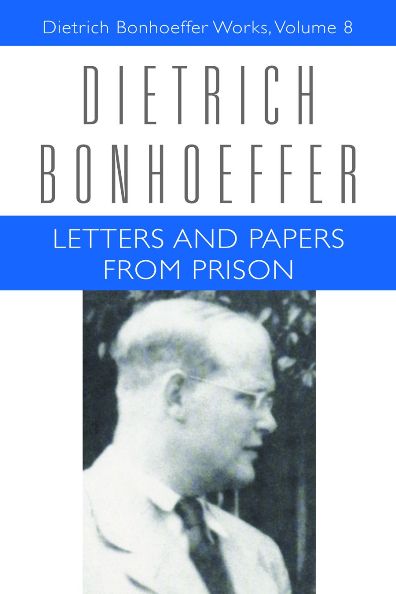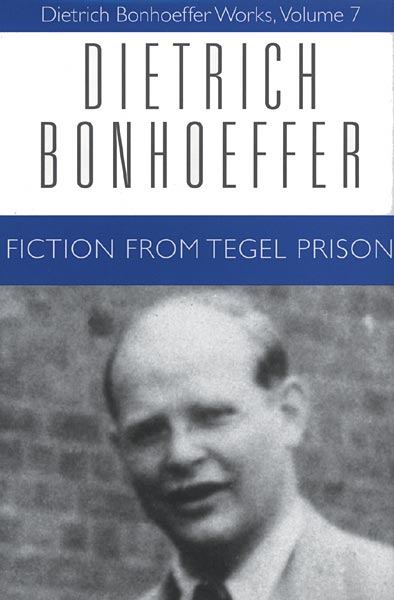LHP Review: Bonhoeffer
Bonhoeffer, Dietrich. Fiction from Tegel Prison (Dietrich Bonhoeffer Works Volume 7). Minneapolis: Fortress, 2000. 287 Pages. Cloth. $39.00. http://www.augsburgfortress.org/ (LHP)
Bonhoeffer, Dietrich. Letters and Papers from Prison (Dietrich Bonhoeffer Works 8). Minneapolis: Fortress, 2010. 750 Pages. Cloth. $60.00. http://www.augsburgfortress.org/ http://www.fortresspress.com/ (LHP)
I read volume eight before tackling volume seven. And I'm glad I did.
Volume 8 of Dietrich Bonhoeffer Works gets to the heart of the controversy that still surrounds him.
Imprisoned for participating in a plot to assassinate Hitler, Bonhoeffer is a surprisingly prolific writer. Many volumes in the series are thick. The $60 price tag for the hardcover of this volume is deserved.
Despite Dietrich Bonhoeffer's earlier theological achievements and writings, it was his correspondence and notes from prison that electrified the postwar world six years after his death in 1945. The materials gathered and selected by his friend Eberhard Bethge in Letters and Papers from Prison not only brought Bonhoeffer to a wide and appreciative readership, especially in North America, they also introduced to a broad readership his novel and exciting ideas of religionless Christianity, his open and honest theological appraisal of Christian doctrines, and his sturdy, if sorely tried, faith in face of uncertainty and doubt.
This splendid volume, in many ways the capstone of the Dietrich Bonhoeffer Works, is the first unabridged collection of Bonhoeffer's 1943–1945 prison letters and theological writings. Here are over 200 documents that include extensive correspondence with his family and Eberhard Bethge (much of it in English for the first time), as well as his theological notes, and his prison poems. The volume offers an illuminating introduction by editor John de Gruchy and an historical Afterword by the editors of the original German volume: Christian Gremmels, Eberhard Bethge, and Renate Bethge. (publisher's website)
The Publisher draws attention to the posthumous controversy about Bonhoeffer's "religionless Christianity," deemed "exciting" in one of the paragraphs on the AF site. I must disagree with that assessment and the interpretation of Bonhoeffer's words that fuels it.
Most of the confusion about this term "religionless Christianity" must lay at the feet of those who would claim Bonhoeffer as their own whose words would be repurposed for their purposes. I do not believe the author was pushing for an end to Christian theology as we know it from Scripture. I believe his concern is more clearly expressed elsewhere. The term "cheap grace" comes to mind. I am becoming convinced that he was concerned more with the actions and practice of Christians than the doctrines themselves.
Yes, the lack of clarity of his ideas could and should be attributed to the fact that we do not have a final, author-approved published manuscript of the book Bonhoeffer planned to write. We have the writings, scribbles, and drafts of an imprisoned, death-row author and theologian partially cut off from the world outside.
I must admit surprise in how much contact he did have through letters, other correspondence, and reading material he was allowed by the Nazis. He was not as cut off from the outside world as much as I had previously assumed. It is good for books like the DBW series to correct my faulty assumptions and replace them with facts.
Allow me to return the favor.
Reference to "religionless Christianity" is found throughout the volume, in introductions, conclusions, and Bonhoeffer's actual text (20, 25, 26, 362-4, 367, 372, 429, 444, 475, 490, 577, 586, 588, 602, et al). The chief reference begins on 362:
What keeps gnawing at me is the question, what is Christianity, or who is Christ actually for us today?His concerns?
We are approaching a completely religionless age; people as they are now simply cannot be religious anymore. Even those who honestly describe themselves as "religious" aren't really practicing that at all...Europe today is increasingly secular. Churches are empty. Yet, Europe is full of religion. Mosques are growing.
One can define the term "religion" as repeated actions, say, merely going through the motions "religiously," or as actual religions such as Judaism, Christianity, Islam, etc.
His next sentences continue his earlier thought about what I could call "hyprocrites," who, like the poor, we will always have with us. Footnote 11 seems to provide a definition for an obscure theological term that deems sinful humans capable of reaching out to God, a fact denied by Scripture as a whole. It is the Lord who must act in conversion and salvation as well as sanctification!
Later he says,
How can Christ become Lord of the religionless as well? Is there such a thing as a religionless Christian? If religion is only the garb in which Christianity is clothed--an this garb looked very different in different ages--what then is religionless Christianity?And there we have the source of the controversy. I assert that his words are an attack on hypocritical Christianity, "going through the motions" religiosity, pietism without piety, "Church" without Christ. At the same time Bonhoeffer is struggling with how to communicate Christ without the trappings of what people have done and said without their true meaning, of baptizing without catechizing, of doing weddings without premartial preparation, of being what some have called "a burying Sam" of a preacher.
I will always be troubled by Bonhoeffer's fondness for Gandhi as a source of theology and practice. I will always be curious about Bonhoeffer's theology and practice of Baptism. I will never be at peace with the fact that he served both Reformed and Lutheran congregations, groups with theological positions that cannot both be true.
Yet, I will not lay the total blame for the confusion and misunderstanding and misinterpretation of the phrase "religionless Christianity" at his feet alone. They are not words designed to find theological truth everywhere. They are not an excuse to dissolve traditional, Biblical, and apostolic theological truths about Jesus, God, and salvation in favor of the flavor of the age.
His words are occasion for repentance, renewal, faith, and an intention to "walk the talk" of the Christian faith.
Writing fiction, letters to his family, fiancée, and friends and contending with his interrogator occupied Bonhoeffer during his first year in Tegel Prison. Of the incomplete drama, the novel fragment, and the short story, Bonhoeffer admitted to his friend and later biographer, Eberhard Bethge, "There is a good deal of autobiography mixed with it." This book discloses a great deal of Bonhoeffer's family context, social world, and cultural milieu. Events from his life are recounted in a way that embodies and illuminates his theology. Characters and situations that represent Nazi types and attitudes are a form of social criticism and help to explain Bonhoeffer's participation in the resistance movement and the plot to kill Adolf Hitler, for which he was hanged.Honestly, I found much of Bonhoeffer's fiction to be unremarkable. That is not to claim that my fiction (if I had any) would be as or more remarkable, but simply that Bonhoeffer's gifts are elsewhere, such as his famous wedding sermon from Volume 8 (82-87). I regularly quote it in my premarital preparation classes.
This important volume, now in paperback, is complete and authoritative and contains much material not found in the previous edition. The German edition of this volume was edited by Bonhoeffer's niece, Renate Bethge—who brings personal knowledge of the Bonhoeffer family to her observations—and Ilse Tödt, who contributed much of the commentary. The English edition is edited by Clifford Green, who also edited the earlier version of the book, titled Fiction from Prison.
What I found to be truly helpful for all of the controversy about Bonhoeffer and those who have tried to reinterpret "religionless Christianity" is the simple fact that one more than one occasion, he uses his fiction to get across the same point in a more clear way. Let's interpret unclear passages of Bonhoeffer using clearer passages.
In Scene 3 of his Drama, the character Heinrich says:
Don't think that it is the new ideas that are important to us. They may be important to the writers, who profit from them. What do we care about new ideas? I can assure you that we have neither the desire nor the time to chase after originality at any price. We want something much simpler, ground under our feet so we can live. That's what I call the foundation. Can't you feel the difference? People like you have a foundation, you have ground under your feet, you have a place in the world. there are things you take for granted, that you stand up for, and for which you are willing to put your head on the line, because you know your roots go so deep that they'll sprout new growth again. The only think that counts for you is to keep your feet on the ground (68).
Consider this conversation in the novel:
"You know, Grandma, we've outgrown this kind of preacher wisdom just like we've outgrown our Latin teachers rattling of Ostermann's exercises. I really can't understand how you can bear to listen to it Sunday after Sunday.
At the time she had replied, "Dear boy, what's important is not that something is new, but that it's right. And we need to hear what's right again and again, because unfortunately we keep forgetting it."
"I don't understand," he had replied, "I don't get it at all. On the contrary, I can recite all those sanctimonious cliches backwards and forwards."
"Yes, you know them in your head and your lips can rattle them off, my dear, but the heart and the hand learn more slowly" (74).There is, Bonhoeffer declares, a difference between "Christianity" and "its pathetic representatives," himself included.
Don't let scholars from fifty years ago color your impression of Dietrich Bonhoeffer. Read him for yourself. AF has hardcover, paperback, and Kindle versions of DBW volumes. Test my assertions by reading Bonhoeffer yourself.
Bonhoeffer is worth reading.
Even if you disagree with him.
The
Rev. Paul J Cain is Pastor of Immanuel Lutheran Church, Sheridan,
Wyoming, Headmaster of Martin Luther Grammar School, a member of the
Board of Directors of The Consortium for Classical and Lutheran
Education, Wyoming District Worship Chairman, and Editor of QBR.





